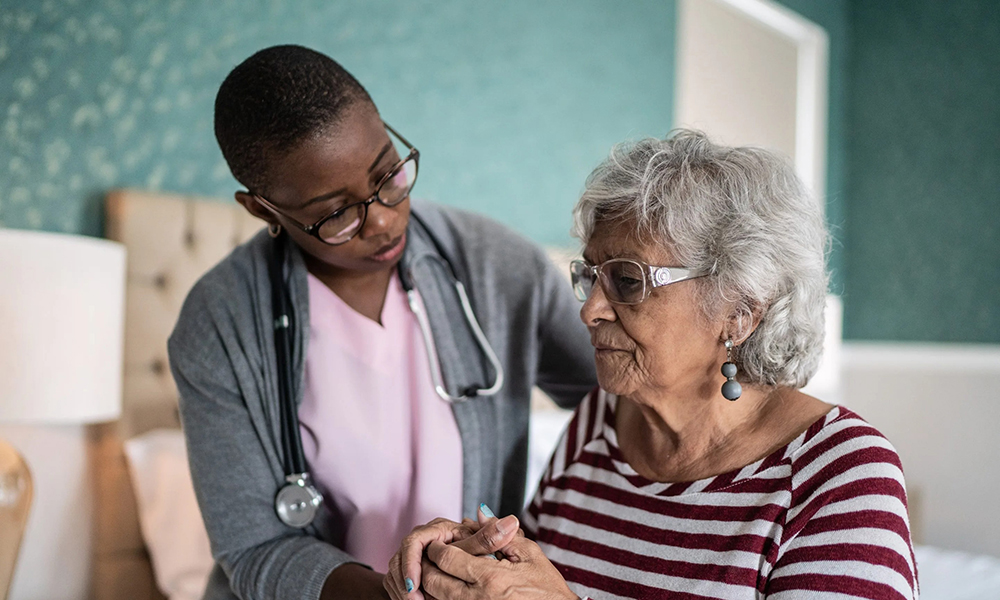
珍·奥利芙的父亲是一名充血性心衰患者,在新冠疫情期间曾经三次住院,每次住院都剥夺了他与家人在一起的宝贵时间,因为在新冠疫情期间,医院是不允许家属探望的。
作为百思买健康公司(Best Buy Health)的首席技术官,奥利芙有一种发自内心的感觉:事情本来是不必如此的。
在美国加利福尼亚州玛丽安德尔湾举办的《财富》头脑风暴健康大会上,奥利芙对观众表示,日常住院治疗使用的技术其实“并没有那么复杂。我们也有设备,我们能够通过Wi-Fi连接这些设备,我们可以建搭平台,来管理和监控这些设备,我们还能够设置警报功能,好知道什么时候出了状况。”
奥利芙认为,“在家住院”的护理模式,也就是医护人员都通过视频巡视和其他监控设备来远程诊断的模式,可以改善他父亲的治病体验和与病魔战斗的意志。同时也能够减轻病人家属的压力。
“如果是我爸爸在家住院的话,至少我们就可以随时了解到他的情况。”她说。
奥丽芙和医疗保健行业的一些领军人物参加了本次大会的数据和技术小组的讨论,此次活动由通用电气医疗集团(GE HealthCare)承办,由《财富》资深编辑葛继甫(Geoff Colvin)主持。专家们表示,一些患者的护理方式已经在发生转变,而且用不了多久,你可能就会在身边看见在家住院的例子。据约翰斯·霍普金斯大学医学院(Johns Hopkins Medicine)介绍,在美国,一些类似项目已经存在了,它们主要由美国退伍军人事务部(U.S. Department of Veterans Affairs)和私人医疗系统运营。
在家住院的理念能够应用到很多场景,比如术后恢复和精神病治疗等等。奥利芙称,市场对在家住院的需求是很大的。“因为大家都想待在自己家里,所以商机是很大的。我们只是要改变这种文化,让人们接受它,而且还要彻底改变一些消费模式。”
范德比尔特大学医学中心(Vanderbilt University Medical Center)的放射学、生物医学信息学和心血管医学教授J·杰弗里·卡尔医生表示,他的医院就在使用这种模式,监测接受免疫疗法的癌症患者的康复情况,这种在家住院的监测过程会长达几周。
他指出,大多数服用强效药物的病人都并无大碍。“然而不幸的是,他们必须要待在医院里。”然而也有少数人会发展出有可能危及生命的并发症。这就是为什么医院要远程监测他们的血压和血氧饱和度,“以预测谁会出现问题。”
他还说:“我们提供的护理服务与在医院住院是一样的,只不过患者可以待在家里。”患者在自己的家中显然更舒服,另外,医院的床位也能够腾出来给更需要的病人。
通用电气医疗集团的爱迪生AI与平台部门(Edison AI and Platform)的总经理维格尼什·谢蒂指出,现在家庭已经逐渐成为“护理的延伸”,成为了医疗护理的一个终端,而医院则是另一端。
专家们认为,在家住院要想全面普及,还需要一些时间。联邦基金(The Commonwealth Fund)称,很多医疗服务提供商不愿意推广在家住院,是因为担心患者的安全和相应的法律风险,同时,也不是所有医保公司都愿意为这种非传统的医疗服务买单。不过奥利芙依然坚信,两年后,这种护理模式将会变得更加普遍。
“医疗领域将出现消费化的趋势,总有一天, 我们之中的很多人的身体也会出问题,而我希望在家里得到照护。”她说。(财富中文网)
译者:朴成奎
珍·奥利芙的父亲是一名充血性心衰患者,在新冠疫情期间曾经三次住院,每次住院都剥夺了他与家人在一起的宝贵时间,因为在新冠疫情期间,医院是不允许家属探望的。
作为百思买健康公司(Best Buy Health)的首席技术官,奥利芙有一种发自内心的感觉:事情本来是不必如此的。
在美国加利福尼亚州玛丽安德尔湾举办的《财富》头脑风暴健康大会上,奥利芙对观众表示,日常住院治疗使用的技术其实“并没有那么复杂。我们也有设备,我们能够通过Wi-Fi连接这些设备,我们可以建搭平台,来管理和监控这些设备,我们还能够设置警报功能,好知道什么时候出了状况。”
奥利芙认为,“在家住院”的护理模式,也就是医护人员都通过视频巡视和其他监控设备来远程诊断的模式,可以改善他父亲的治病体验和与病魔战斗的意志。同时也能够减轻病人家属的压力。
“如果是我爸爸在家住院的话,至少我们就可以随时了解到他的情况。”她说。
奥丽芙和医疗保健行业的一些领军人物参加了本次大会的数据和技术小组的讨论,此次活动由通用电气医疗集团(GE HealthCare)承办,由《财富》资深编辑葛继甫(Geoff Colvin)主持。专家们表示,一些患者的护理方式已经在发生转变,而且用不了多久,你可能就会在身边看见在家住院的例子。据约翰斯·霍普金斯大学医学院(Johns Hopkins Medicine)介绍,在美国,一些类似项目已经存在了,它们主要由美国退伍军人事务部(U.S. Department of Veterans Affairs)和私人医疗系统运营。
在家住院的理念能够应用到很多场景,比如术后恢复和精神病治疗等等。奥利芙称,市场对在家住院的需求是很大的。“因为大家都想待在自己家里,所以商机是很大的。我们只是要改变这种文化,让人们接受它,而且还要彻底改变一些消费模式。”
范德比尔特大学医学中心(Vanderbilt University Medical Center)的放射学、生物医学信息学和心血管医学教授J·杰弗里·卡尔医生表示,他的医院就在使用这种模式,监测接受免疫疗法的癌症患者的康复情况,这种在家住院的监测过程会长达几周。
他指出,大多数服用强效药物的病人都并无大碍。“然而不幸的是,他们必须要待在医院里。”然而也有少数人会发展出有可能危及生命的并发症。这就是为什么医院要远程监测他们的血压和血氧饱和度,“以预测谁会出现问题。”
他还说:“我们提供的护理服务与在医院住院是一样的,只不过患者可以待在家里。”患者在自己的家中显然更舒服,另外,医院的床位也能够腾出来给更需要的病人。
通用电气医疗集团的爱迪生AI与平台部门(Edison AI and Platform)的总经理维格尼什·谢蒂指出,现在家庭已经逐渐成为“护理的延伸”,成为了医疗护理的一个终端,而医院则是另一端。
专家们认为,在家住院要想全面普及,还需要一些时间。联邦基金(The Commonwealth Fund)称,很多医疗服务提供商不愿意推广在家住院,是因为担心患者的安全和相应的法律风险,同时,也不是所有医保公司都愿意为这种非传统的医疗服务买单。不过奥利芙依然坚信,两年后,这种护理模式将会变得更加普遍。
“医疗领域将出现消费化的趋势,总有一天, 我们之中的很多人的身体也会出问题,而我希望在家里得到照护。”她说。(财富中文网)
译者:朴成奎
Jean Olive’s father, a congestive heart failure patient, was hospitalized three times during the pandemic. Each stay robbed him of precious time with family members, who were not allowed to visit.
Olive, the chief technology officer at Best Buy Health, had a visceral feeling: Things didn’t need to be this way.
Technology used during routine hospitalizations “is not all that complex,’” she told audience members at Fortune’s Brainstorm Health conference in Marina del Rey, Calif. “We have devices, we can connect devices through Wi-Fi, we can build platforms, we can manage and monitor those devices, we can set alerts and know when there’s a differentiation.”
Olive believes “hospital at home” care—in which doctors, nurses, and other specialists do “rounds” to the houses of patients, who are monitored remotely via video and diagnostic equipment—could have improved her dad’s experience, as well as his morale. It would have also eased the minds of his family members.
“At least with my dad, we would have known what was going on with him,” she said.
Olive and other healthcare leaders on the conference’s data and technology panel, moderated by Fortune senior editor at large Geoff Colvin and hosted by GE HealthCare, said the shift of care for some patients is already underway—and that such an experience will be coming to a community near you soon. In the U.S., some programs already exist, run by the U.S. Department of Veterans Affairs and private health systems, according to Johns Hopkins Medicine.
The concept could be applied to a variety of settings, from post-op to psychiatric care. The demand, she said, is significant, “because people want to stay in their home. There’s so much opportunity. We just have to change the culture, get the adoption, and really try to change some of the payer models.”
Dr. J. Jeffrey Carr, professor of radiology, biomedical informatics, and cardiovascular medicine at Vanderbilt University Medical Center, said his hospital is using the model to monitor cancer patients prescribed immunotherapy over several weeks.
Most patients on the potent drugs will be fine, and “it’s unfortunate they would have to stay in the hospital,” he said. A few, however, will develop life-threatening complications. That’s why the hospital monitors their blood pressure and oxygen saturation remotely, “to try to predict who’s going to have problems.”
We “really provide the same care that we have in the hospital, but in the home,” he said. The patients are more comfortable there—and hospital beds are freed up for patients with more dire needs.
Home is increasingly being seen as an “extension of care,” forming one end of a continuum of care, with the hospital at the other end, Vignesh Shetty, senior vice president and and general manager of Edison AI and Platform at GE HealthCare, said.
Wide implementation of the hospital at home concept will take time, according to the panelists. Providers have pushed back with concerns about patient safety and legal risks, and not all insurance systems want to pay for the unorthodox service, according to The Commonwealth Fund. Olive, however, believes that two years from now, such care will be much more common.
“There’s going to be a consumerization of healthcare,” she said. “There will be a point when many of us go in having issues and say, ‘I want to be managed at home.’”






